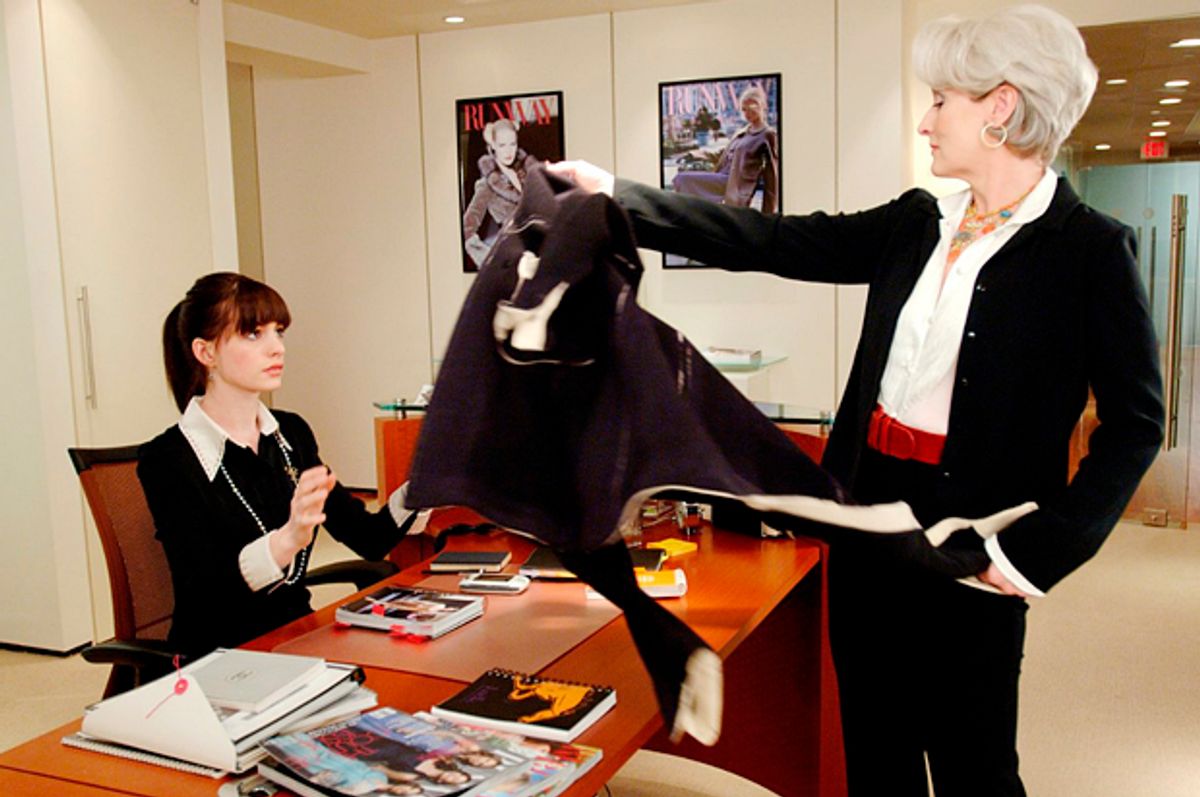Is the “Devil Wears Prada” economy coming to a close? Will the sort-of-abusive, round-the-clock, sadistic-boss culture of entry-level jobs in Hollywood, book publishing, fashion magazines, and Washington politics find itself done in by the new overtime rules?
A colorful story in the New York Times describes the custom, linking it to the movie based on life at Anna Wintour’s “Vogue.”
But now, with the Obama administration moving to require time-and-a-half overtime pay for most salaried employees making less than $47,476 a year, that business model is suddenly under assault. The change presents more than an economic challenge for the companies that rely on the willingness of young, ambitious workers to trade pay and self-respect for a shot at a prestige job down the road.
The story quotes from a number of veterans of these jobs, and others who worry that they will have to hire fewer of these assistants and associates, or that the rigor of those early positions will decline.
“Less will be asked of them,” Jill Salayi of Workman Publishing told the Times, “which means they will not receive sufficient career development or see timely advancement and/or promotions.” Susan Prytherch, who directs human resources for Clinton-antagonists Judicial Watch, said, “We would send them to the Clinton library if we’re doing an investigation. We may think differently before sending them off.”
There are probably good reasons to feel a sense of loss if this custom dies: There’s value to people who may one day be at the top of a field seeing what it looks like from the bottom. It’s worth it for anyone in any field to learn the value of hard work. And one advantage to having a job like that: Just about anything else will seem like an improvement.
But here’s the problem: If it takes a low-paying, schedule-devouring job to enter politics, the movies, publishing, or anything else, the only people who can enter those fields will be people with considerable financial resources. This would just be a footnote if our culture and our politics weren’t fairly important spheres of American life.
Here’s another bit from the Times story:
A former employee of the Wylie Agency said assistant literary agents there — usually eight to 10 in the New York office — typically earned in the $30,000s and routinely worked 50 to 60 hours a week without overtime pay.
The former Wylie employee, who spoke on the condition of anonymity because of fear of reprisals, said that there was such an expectation of long hours that anyone arriving after 9 a.m. or leaving before 6:30 p.m. generally felt compelled to email the entire office, giving a reason for being AWOL.
Any recent college graduate who can afford to work for something around $30,000 in New York without needing to take on additional part-time work must be getting money from somewhere else, probably parents. We end up with a cross between the Unpaid Intern Problem and the Taylor Swift problem – named for a musician whose career took off in part because of her banker parents spent enormous sums to support it.
Since wealth inequality has widened along racial and ethnic lines since the Great Recession, according to the Pew Research Center, this gap in opportunity affects not only diversity in socioeconomic background, but also in race and ethnicity.
Hollywood in particular has been criticized lately over its lack of diversity, particularly on race. The custom of the production assistant who earns next to nothing while fetching coffee and running errands for 12-hour days may lead to fun stories about dues-paying years later, and it can also lead to a job in Hollywood. But is it any wonder that it this system mean the field doesn’t vary much by race and class?
And since the people who work for movie studios, Hollywood agencies, publishing houses, and slick magazines typically produce or at least filter what the rest of us see and hear and read, this becomes even more consequential. It's true in a slightly different but equally important way in politics.
Will people trying to break into creative fields no longer have to hear “Find me that piece of paper I had in my hand yesterday morning” or “details of your incompetence do not interest me?” That probably won’t change. But if overtime reform allows them to be paid enough to live, however humbly, in the expensive city in which they’re required to work, these professions might find themselves better for it.

Shares